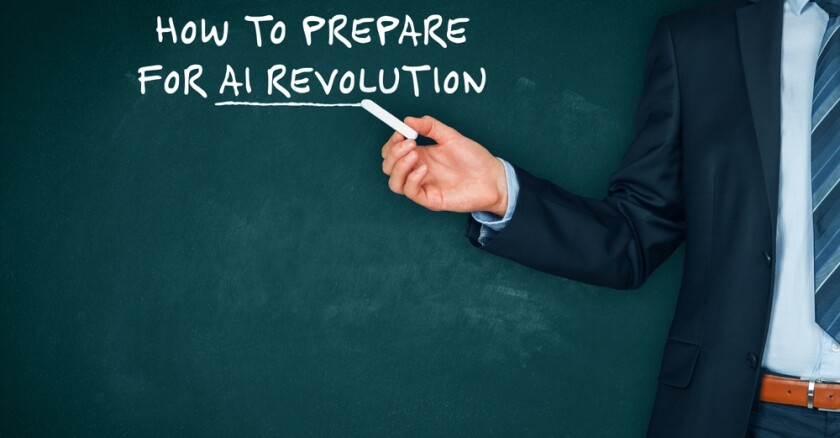Science
Iowa Educators Explore AI’s Role in Shaping Future Workforce

Educators from the College Community School District in Cedar Rapids, Iowa, participated in a professional development program focused on the transformative impact of artificial intelligence (AI) on the workforce. The initiative, held on March 5 and 6, 2024, aimed to equip teachers with insights into local economic trends and the essential role education plays in fostering a robust community.
Superintendent Doug Wheeler emphasized the significance of collaboration between educators and workforce leaders. He stated, “Working together is the first step to preparing our students for better lives, so they will be happy and we will have stronger communities and a strong economy.” The event was organized in partnership with the Cedar Rapids Metro Economic Alliance, which highlighted the pressing need to understand current and future workforce demands, particularly concerning technology and AI.
Insights from Industry Leaders
The program commenced with a welcome from Juliet Abdel, the newly appointed President and CEO of the Cedar Rapids Metro Economic Alliance. She addressed the educators, stating, “Your role is such an important factor in the future of our leaders, the future of our entrepreneurs, the future of business professionals and even service members.” This sentiment underscored the critical influence teachers have in shaping the skills necessary for success in an evolving economic landscape.
Educators had the opportunity to tour local businesses, gaining firsthand knowledge of various industries and the skill sets required for future employment. Among the speakers was Tieg Weathers, data center site facility manager for Google. He informed attendees about the rapid growth of data center projects, noting that the demand for such facilities is “fast and furious.” Google and QTS are currently constructing data centers in Cedar Rapids that will house essential computer servers and data storage equipment.
Weathers shared his personal journey from earning a degree in anthropology at the University of Iowa to securing a position at Google. He explained the rigorous hiring process, which averages seven interviews per candidate, emphasizing the importance of technical skills and problem-solving abilities in prospective employees. “What are you doing to better yourself?” is a common question posed to job applicants, highlighting the need for continuous self-improvement.
Integrating AI into Education
Another key speaker, Manda Marshall, an AI support team manager at the University of Iowa, discussed the importance of AI in the classroom. She urged educators to utilize AI not as a replacement for their teaching, but as a tool to enhance their existing methods. “AI is something we want to utilize — not to create things for you or do your work — but to amplify what you already do,” she stated.
Marshall underscored the importance of teaching students digital and AI literacy, addressing concerns that students might misuse AI for academic dishonesty. She proposed that educators shift their focus from policing student behavior to embedding AI responsibly into their curricula. One practical example she provided was comparing student-written essays with those generated by AI, fostering discussions about the differences.
Marshall encouraged teachers to explore various AI applications that can provide feedback on assignments while safeguarding student confidentiality. “Be that human in the loop,” she advised, emphasizing the need for transparency about the use of AI in educational settings.
During a panel discussion, five members of the College Community district’s Career Academy Advisory Committee shared their insights on how AI is being integrated into their businesses. Danielle Monthei, the community impact manager at Van Meter Inc., expressed enthusiasm for leveraging AI to solve problems and maintain competitiveness. She acknowledged the potential risks of AI, stating, “We’re really worried about that, but we’ve got to hurry up and figure it out because everyone else is going to too.”
Similarly, Jillian Walsh, senior manager of business development at Travero, highlighted the practical applications of AI in logistics. She explained how AI enables her company to provide timely quotes to customers during off-hours, stating, “If we’re not in the office to provide a price, you can lose that bid in a matter of minutes or seconds.”
The professional development program served as a vital platform for educators to engage with industry leaders, fostering a deeper understanding of the evolving job market and the skills necessary for future success. As the demand for AI and technology continues to rise, initiatives like this one are crucial for preparing students to thrive in an increasingly complex workforce.
-

 Entertainment2 weeks ago
Entertainment2 weeks agoAndrew Pierce Confirms Departure from ITV’s Good Morning Britain
-

 Health4 months ago
Health4 months agoNeurologist Warns Excessive Use of Supplements Can Harm Brain
-

 Health4 months ago
Health4 months agoFiona Phillips’ Husband Shares Heartfelt Update on Her Alzheimer’s Journey
-

 Science2 months ago
Science2 months agoBrian Cox Addresses Claims of Alien Probe in 3I/ATLAS Discovery
-

 Science2 months ago
Science2 months agoNASA Investigates Unusual Comet 3I/ATLAS; New Findings Emerge
-

 Entertainment1 week ago
Entertainment1 week agoGogglebox Star Helena Worthington Announces Break After Loss
-

 Entertainment1 month ago
Entertainment1 month agoTess Daly Honoured with MBE, Announces Departure from Strictly
-

 Science2 months ago
Science2 months agoScientists Examine 3I/ATLAS: Alien Artifact or Cosmic Oddity?
-

 Entertainment3 months ago
Entertainment3 months agoLewis Cope Addresses Accusations of Dance Training Advantage
-

 Entertainment5 months ago
Entertainment5 months agoKerry Katona Discusses Future Baby Plans and Brian McFadden’s Wedding
-

 Science2 months ago
Science2 months agoNASA Investigates Speedy Object 3I/ATLAS, Sparking Speculation
-

 Entertainment5 months ago
Entertainment5 months agoEmmerdale Faces Tension as Dylan and April’s Lives Hang in the Balance









